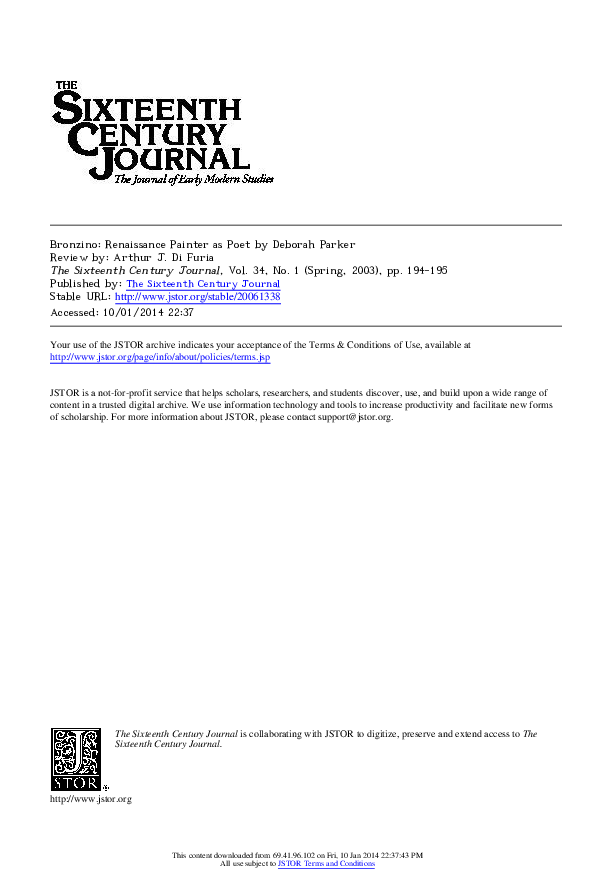Academia.edu no longer supports Internet Explorer.
To browse Academia.edu and the wider internet faster and more securely, please take a few seconds to upgrade your browser.
Review: Deborah Parker. Bronzino: Painter as Poet (Cambridge, 2000), in Sixteenth Century Journal, Vol. 34, no. 1 (Spring, 2003): 194–95.
Review: Deborah Parker. Bronzino: Painter as Poet (Cambridge, 2000), in Sixteenth Century Journal, Vol. 34, no. 1 (Spring, 2003): 194–95.
Review: Deborah Parker. Bronzino: Painter as Poet (Cambridge, 2000), in Sixteenth Century Journal, Vol. 34, no. 1 (Spring, 2003): 194–95.
Review: Deborah Parker. Bronzino: Painter as Poet (Cambridge, 2000), in Sixteenth Century Journal, Vol. 34, no. 1 (Spring, 2003): 194–95.
Review: Deborah Parker. Bronzino: Painter as Poet (Cambridge, 2000), in Sixteenth Century Journal, Vol. 34, no. 1 (Spring, 2003): 194–95.
Related Papers
With analysis of the two sonnets displayed in the portrait (RS 64, 240) and a sonnet sequence in Bronzino's Rime (Bib. Naz. ms. Magl. II.IX.10) involving Bronzino, il Lasca, and Varchi, the essay explores the likeness of Battiferra as a new Laura, new Dante, and new Petrarch.
The great sculptor Vincenzo Danti wrote one of the longest poems to have survived from a Renaissance artist, but the text's close thematic and conceptual connections to its author's art have gone entirely unnoticed. What Danti's poem and sculpture share, this essay argues, is a concern with mystified identity. Danti's poetic sensibility stands at odds with the biographical frameworks that typically guide the interpretation of Renaissance art and literature. At the same time, his example shows how much there is to be gained from an investigation of how artists learned to be writers, and of what came of those efforts.
Proceedings of Conference "Strong Voices: Weak History: Medieval and Renaissance Women in their Literary Canons. England, France, and Italy. Univ. of Pennsylvania, March 2000.
The Unseeing Masks: The Meaning of the Two Masks in Michelangelo Buonarroti's Venus and Cupid of 1532-1534.
The Unseeing Masks: The Meaning of the Two Masks in Michelangelo Buonarroti's Venus and Cupid of 1532-1534.2019 •
It is hard to ignore the satyr-like mask that ogles Venus and her son in Jacopo da Pontormo’s Venus and Cupid (1532-34) (Fig. 1), a painting based on a lost cartoon by Michelangelo (Fig. 2). Partly obscured by this mask, a more impassive mask faces the opposing direction, as if deliberately to evade the erotic interaction between the incestuous couple. Michelangelo was the first to introduce the motif of masks accompanying the goddess of love and her son, a motif that was soon replicated and elaborated upon by a number of sixteenth century artists. The masks themselves have received little attention in scholarly literature; they have typically been dismissed as symbols of love’s deceit. An explanation of how Michelangelo’s use of two masks accompanying Venus and Cupid was meant to be interpreted by the painting’s contemporary Florentine audience will argue for a more complex reading, and will question whether the masks were simply symbols of a single idea.
Responding to a provocative passage in Mario Equicola's "Libro di natura d'amore" in which male beauty is cast in feminine terms and female beauty is appreciated for its masculinity, this paper considers the aesthetics of gender in 16th century Italian art.
I Tatti Studies in the Italian Renaissance
"After the Veronica: Crisis and the 'Ars sacra' of Polidoro da Caravaggio and Pontormo."2014 •
RELATED PAPERS
Zeitschrift Fur Kunstgeschichte
An Aldine Volume of Petrarch Illuminated for a Prestigious Patron2010 •
Mediaevalia 33
Omnia Vincit Amor: The Sovereignty of Love in Tuscan Poetry and Michelangelo's Venus and Cupid2012 •
Mitteilungen des Kunsrhistorischen Institutes in Florenz
“Essendo di natura libero e sciolto”. A proposal for the identification of the painter Visino and an analysis of his role in the social and cultural life of Florence in the 1530s and 1540s2010 •
1990 •
Simiolus: Netherlands Quarterly for the History of Art
Bellori's art: the taste and distaste of a seventeenth-century art critic in Rome2006 •
Annual of Medieval Studies at CEU
Benvenuto Cellini’s Vita: An Attempt at Reinstatement to the Florentine Academy?2018 •
2000 •
1999 •
Renaissance Quarterly, 66, no. 1 (2013), 81-129
"To Sow the Heart: Touch, Spiritual Anatomy, and Image Theory in Michelangelo’s 'Noli me tangere'"Transformations of Time and Temporality in Medieval and Renaissance Art
Ch 10 The Ambivalent Scorpio in Bronzino's London Allegory2014 •
Journal of the Warburg and Courtauld Institutes, vol. 81
Vasari's Castle in the Air2018 •
Transformation of Time and Temporality in Medieval and Renaissance Art
Transformations of Time and Temporality in Medieval and Renaissance Art2014 •
2006 •
WONDER WOMEN: SOFONISBA ANGUISSOLA, LAVINIA FONTANA AND ARTEMISIA GENTILESCHI A CRITICAL ANALYSIS OF RENAISSANCE AND BAROQUE SELF-PORTRAIT PAINTING BY FEMALE ARTISTS
WONDER WOMEN: SOFONISBA ANGUISSOLA, LAVINIA FONTANA AND ARTEMISIA GENTILESCHI A CRITICAL ANALYSIS OF RENAISSANCE AND BAROQUE SELF-PORTRAIT PAINTING BY FEMALE ARTISTS2017 •

 Arthur J . DiFuria
Arthur J . DiFuria